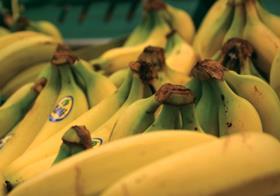
Intense competition among retailers seeking to offer cheap, recession-busting products is placing immense pressure on all players in the European banana supply business, with falling consumer demand creating further pressure in what is an already over-supplied trading environment.
As reported in this month's Eurofruit Magazine, several of the banana industry's leading players have confirmed the European banana market is arguably at its lowest ebb for decades, with companies compelled to trim their costs in order to sustain significantly lower market prices.
Kevin Bragg, managing director of Belgium-based importer Bonita, told Eurofruit the whole sector has been experiencing a difficult time.
“All the big banana companies have had a very difficult year in Europe,” he explained. “Volumes are down and so are prices, primarily because the supermarkets are involved in a major price war. For supermarkets, bananas are a key value item.”
Dirk Jacobs of Belgian importer JDL Services agreed. “The supermarkets expect lower and lower prices even though transport, packaging and labour costs have risen significantly these last few years, and still are. It is not sustainable,” he says. “We reached a point where we were losing money on every box we sold.”
The decision by a number of Europe's major retail operators to extend price promotions on bananas has prompted concern among suppliers.
“Following a price promotion by the Intermarché chain that was not discussed with its French Caribbean suppliers, the Casino group followed suit by selling Cameroonian bananas in its Leader Price discount stores at €0.79/kg,” said a spokesperson for Banana Link. “The major importers to the French market are certainly worried that a destructive price war scenario could be spreading from across the Channel.”
Last month, the Guadeloupe and Martinique banana growers’ union UGPBAN took the unprecedented step of halting supplies to Intermarché in protest at its pricing strategy, under which bananas were apparently being sold at less than half the normal retail price.
“The sales strategies of the banana producers from Guadeloupe and Martinique, and of the Intermarché group do not match,” the union stated. “On account of this, we will no longer supply bananas to Intermarché.”
Static sales
Meanwhile, according to new figures published by the European Commission’s statistical office Eurostat, there has been no significant increase in the volume or value of imported bananas sold in the European Union.
Despite a notable upturn in the amount of bananas shipped via Belgium, the UK and France between the start of the year and the end of May, there were also significant decreases in the volume of bananas entering Europe via Germany, the Netherlands, Portugal, Poland and Slovenia during the same five-month period.
Only Greece has seen anything like a surge, with import volumes rising 116.6 per cent to 29,412 tonnes during the first five months of 2010.
The Eurostat figures, published for the first time in the October 2010 issue of Eurofruit Magazine, confirm that, in commercial terms, the EU market for bananas has continued to show a general decline since the start of the year.
During the first five months of 2010, the volume of bananas imported into the EU-27 may have been slightly up, by 2.56 per cent from 1.99m tonnes in the same period of 2009 to 2.04m tonnes, but the value of those banana imports was down 2.73 per cent year-on-year from €1.25m to €1.22m.
The downturn in value terms within the European banana import market continues the trend seen over the course of 2009, when the EU-27 imported fewer bananas – 4.59m tonnes compared with 4.9m tonnes in 2008, down 4 per cent.
The value of banana imports during the same year was €2.76m, down 5 per cent on the €2.9m recorded during the previous 12 months.
Additional reporting by Tom Joyce.



